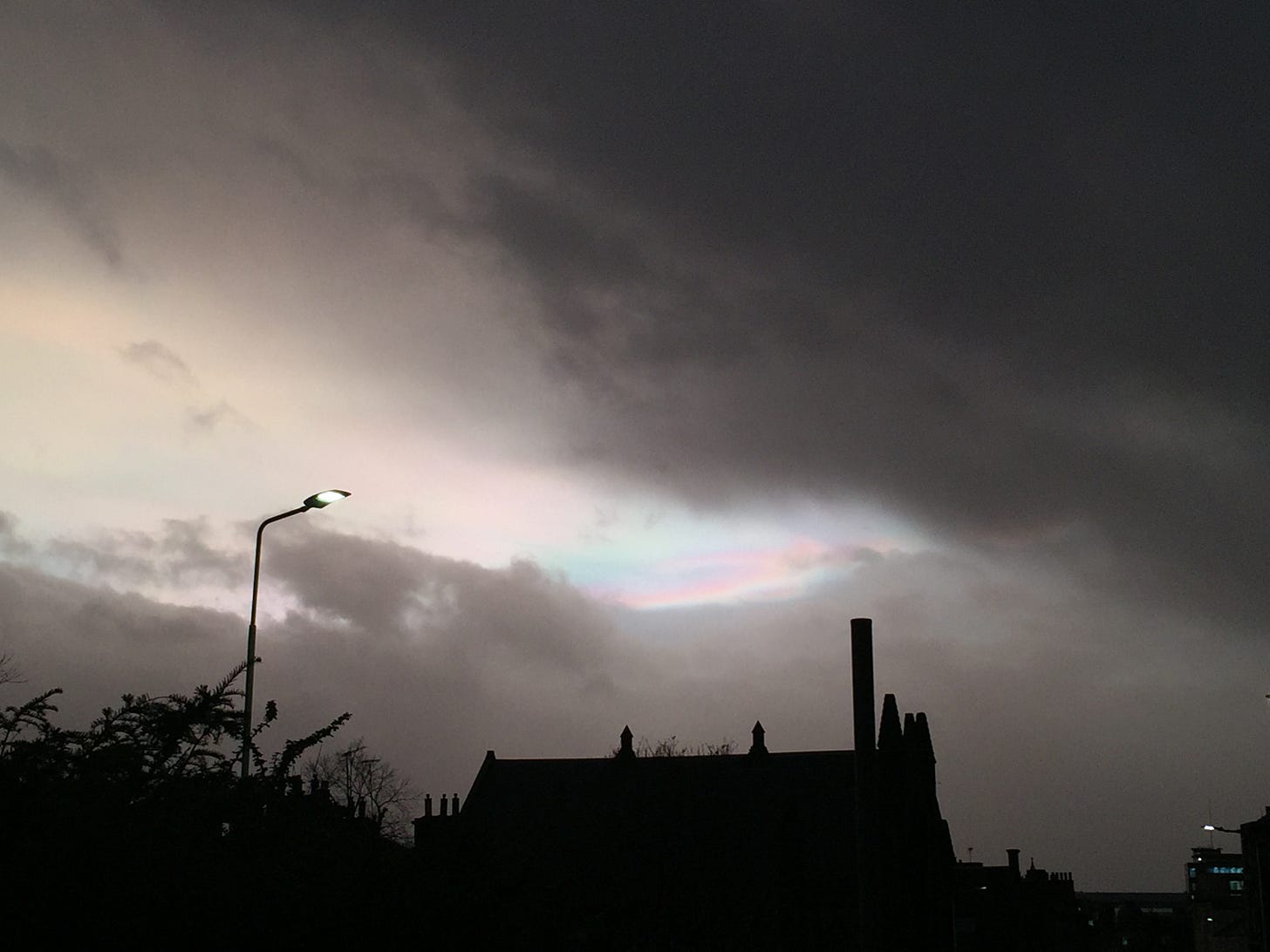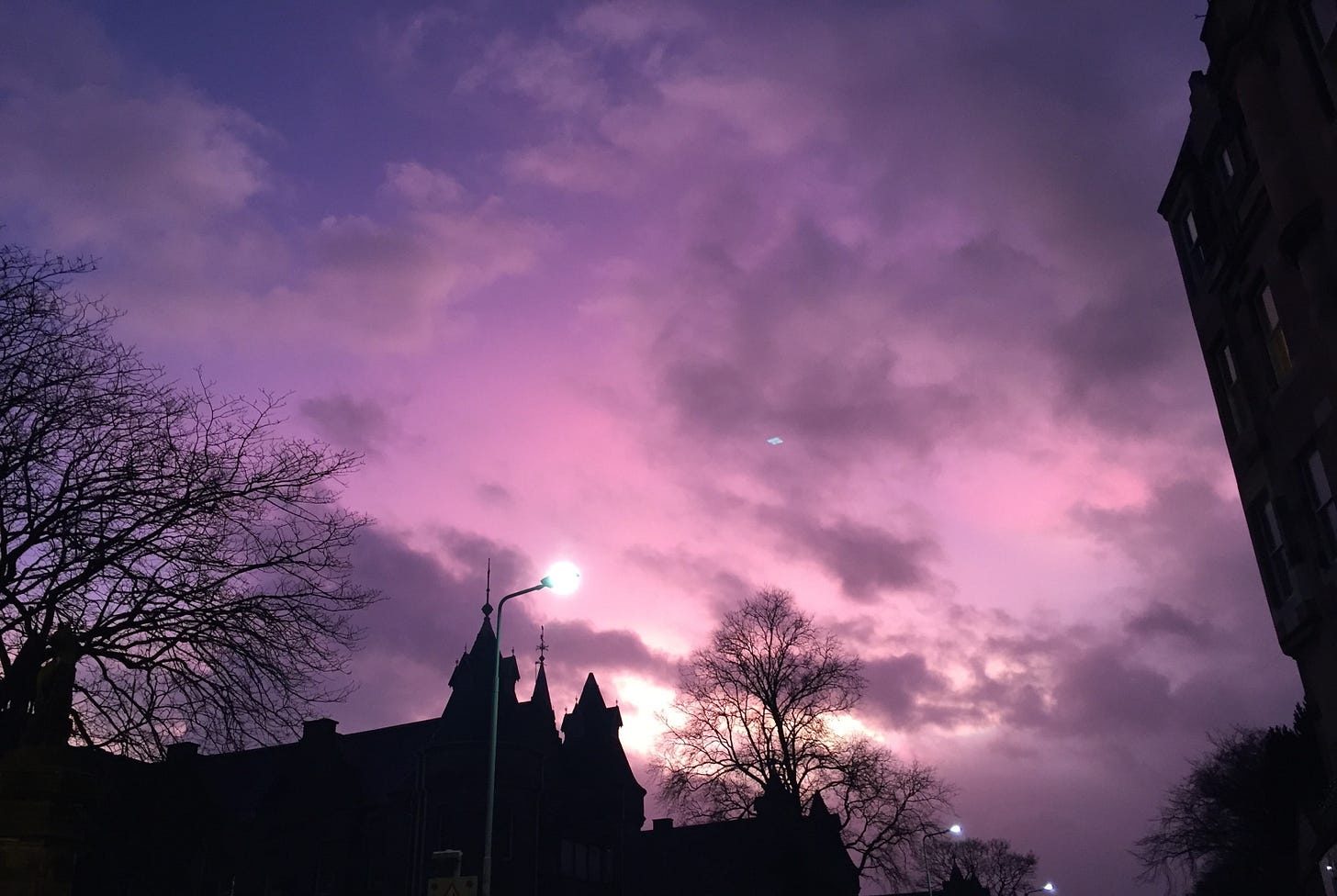I wanted to experiment with narration and sounds, and it turned out to be fun (and a lot of effort). There’s essentially two parts to this narrative. I talk about my experience with breathwork and how it works first, then I try to make sense of the extraordinariness of extraordinary experiences. Also wanted to say that breathwork is a great practice—I hope you give it a try, and if you do, I hope it helps you in some way. Anyway, enjoy and till the next one 🫶🏼
Back in February 2016, I saw two nature phenomena that I still think of to this day. One of them was nacreous clouds, also known as mother-of-pearl clouds or polar stratospheric clouds. They look like fragments of rainbows suspended in cloud formations. I remember staring at them from our product design studio on the fourth floor in college. Minutes passed, maybe fifteen.
By the time I came out of the building, the rainbow clouds had drifted far away enough that I started to think of them as something of the past. The next thing that happened was equally novel to my eyes. The sky turned purple, and it wasn’t the blend of an orange sunset and darkening blue sky. It was this real-life, muted version of cyberpunk purple. I’m a hopeless romantic when it comes to extraordinary experiences like this. They make me feel positively small in a humbling way.
Purple is the first color I started seeing about three months into doing breathwork on a regular basis. The visuals started happening towards the end of the class when my body gets into this deeply relaxed state. Purple glowing bubbles start appearing and dancing with each other. Sometimes, a darker, electric blue gets mixed in. I’ve also seen some orange, pink, and maleficent green. The deeper my concentration got, the more easily the colors manifested.
I landed in my first breathwork class in September 2024. By the end of the class, I lay on the yoga mat experiencing a surreal euphoria. I was giggling uncontrollably and laughed at my own giggling. I wasn’t aware you can shift your consciousness so dramatically with just your breath; it's a fascinating thing to experience.
We do Conscious connected breathwork (CCB) in the classes I go to. It’s an hour and a half of double inhale (first into the belly, then into the chest) and exhale to the rhythm of sounds or music. There are two breath holds, one in the middle of the session and one at the end. The teacher guides us for the first couple rounds of breathing before she leaves us to find our own pace.
The breathing is always uncomfortable in the beginning. I want to stop every other minute as my body resists the unnatural pace and amount of breathing.
Physiologically, you’re essentially doing controlled hyperventilation. Oxygen levels increase in your body and carbon dioxide levels decrease. This activates the sympathetic nervous system (fight or flight response) initially, which is why the breathing feels uncomfortable. It's called breathwork for a reason. There is work to do.
But—after the first breath hold, something interesting happens. My lungs seem to expand as if holding my breath dissolves the boundaries my mind placed on them, showing me their true capacity. Breathing becomes easier and deeper. There’s something quite powerful about discovering that with every breath I can hold it a bit longer. “You have enough, you are enough”, is what the teacher chants during this time, and it’s quite literally how I feel.
During a breath hold, your body is still in stress mode as the sympathetic nervous system remains activated. The parasympathetic nervous system (rest and digest response) is activated when you release the breath hold. The sudden change between hold and release creates a kind of “reset” in the body. This is why I found myself in a deeply relaxed state—my nervous system has essentially switched gears from “fight or flight” to “rest and digest”. In the latter state, your conscious mind steps back. Your body is flooded with endorphins which can create the conditions for euphoria, visual phenomena, and emotional releases to emerge.
I’ve been thinking about what breathwork has given me so far, and I don’t think it’s only pretty visuals and joy. I stuck to this studio’s classes because of their liberal approach to teaching: you are in charge of your experience, you find your own pace and breathe as much / little / fast / slow as you want. It’s the space for you to take up space. For the recovering people-energy-absorber in me, this has been one of the biggest gifts of this practice: to learn to take up space and focus on my own experience without getting pulled into what other people are going through but respecting it regardless.
This was very difficult in the beginning. I couldn’t focus on my own breathing because I was so tuned in to the sounds of the people next to me. You’re supposed to go into these sessions with an intention but no expectations. If you do this right, there’s really no way of predicting what will come up emotionally for you or for the others in the room. Sadness, anger, joy, fear, the need to sing or make sounds like you’re going through an exorcism—the limit is the wide range of human emotions and the subconscious. I remember someone exploding into a booming laugh that infected half the room, including me. A truly unforgettable moment.
Everything was a distraction initially, but I gradually understood its value. Each time my attention was pulled away by another’s experience or my own thoughts, I practiced returning to my breath. This cycle of scattering and returning slowly built up my capacity for deeper focus. That’s what “focusing on your experience” actually means. It’s not perfect concentration from start to finish, just the practiced skill of noticing when you've wandered and finding your way back.
This practice of returning has helped me personalize my breathwork sessions, but it’s also helped me understand why I’m drawn to collective experiences like this in the first place. I always say that my intuition brought me to Berlin. I’m convinced now that it’s been leading me to these experiences where I get to merge with a crowd and allow the merge to transform me by intentionally dissolving boundaries and reclaiming them again.
You’re in this ambiently lit room with 25 other people lying on a mat, covered with a blanket. Everyone is having an experience which is the only common denominator that matters—that we’re all experiencing something and this experience contributes to the collective’s, even if it’s not so evident when we're all in a trance state with our eyes closed.
I’ve met a lot of people who come to Berlin seeking this kind of oneness with a crowd, often through music and hours-long partying. I’ve witnessed an equal amount of loneliness and oneness in this city, maybe even met some of the loneliest and most connected individuals ever. Through these interactions I’ve also met the loneliest and most connected parts of myself. Breathwork and similar practices tend to come after the partying, so the teacher says as she mentions her own journey from parties to breathwork. I still have my feet in both boats.
What exactly makes these experiences extraordinary? is the question I started with, and I landed on the perception of time being an important factor—how our perception of time gets distorted, which leads to a meaningful experience. The idea came from my own notes on small talk and conversations (and why I'm not so good at it):
When I'm playing certain games (e.g. working a day job, going through my tasks), I experience time as we know it—linear and fragmented into articulable chunks. It’s easier to recount what happened and turn it into bits of stories to entertain people in conversations. When I spend long periods doing something that deeply engages me, my relationship to time changes. I get into what Csikszentmihalyi calls “flow states” that make me forget about time. And so, when someone asks me how the past few days or weeks have been, I tend to pause for half a minute because I’m genuinely not sure how much of it was real—like outside my head.
Years ago I picked up a copy of Byung-Chul Han's The Scent of Time from a little bookshop in London. In it, the author introduces this concept of “point-time”—the fragmented, discontinuous time of modern life that captures what I meant by “articulable chunks”. Han argues that our society suffers from “temporal dispersal,” where time lacks narrative structure and meaningful duration.
During breathwork sessions, however, time transforms. It’s no longer a series of disconnected points and becomes something more akin to what Han might call “contemplative time” or time with depth. The hour and a half I spend breathing becomes elastic, sometimes feeling both impossibly brief and eternally expansive. This paradoxical experience of time mirrors what is described as the “scent of time” in the book. It’s time that has substance, that lingers, that can be inhabited rather than merely survived.
Breathwork and other activities that deeply engage us are counterpoints to point-time, but they’re not the antidote to our fragmented experience of time, merely long moments of relief. We simply can't escape the temporal structures of modern life unless we’re prepared to live off-grid in a universe of our own making. I guess, this is something we need to live with.
Plus, too much of anything tends to strip away the magic of the experience itself. I never felt that euphoric giggling thing again even though I was hoping I would. Hoping killed the potential. This is why first times and one-time experiences are so precious, like those clouds and the purple sky I saw.
I stopped hoping for the return of euphoria and tried to nudge myself into a mindset free of expectations before each session. I’m enjoying the tingling sensations in my body and the color visuals—I’ve been seeing more shapes and faster animations lately. My current stance is that breathwork has become a surprisingly grounding experience despite catapulting me into an out-of-body experience each time. There’s comfort in knowing I can always return to my breath—this constant companion that’s both ordinary and extraordinary.
Our breath marks the boundaries of our existence: we draw our first breath when we’re born and our last when we leave this world (stolen from the teacher, she’s quite the poet). Between these two moments, every breath offers an opportunity to either race through time or to inhabit it fully. Breathwork has given me access to both temporal worlds—the transcendent state where time dissolves and the grounded awareness that connects me to the present moment.
At an Ólafur Arnalds concert in Glasgow, I remember him reflecting that despite touring’s incredible highs, “at some point, you have to go home and do your laundry”. So, let’s cherish dream-like experiences but maybe don’t secretly wish for them to happen again or chase them incessantly. Doing your laundry can become a deeply engaging activity as well.
If you want it to be.





